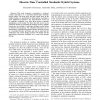18 search results - page 2 / 4 » Arbitrarily modulated Markov decision processes |
GLOBECOM
2008
IEEE
14 years 4 months ago
2008
IEEE
— Adaptive modulation and antenna diversity are two important enabling techniques for future wireless network to meet demand for high data rate transmission. We study a Markov de...
JSAC
2007
13 years 9 months ago
2007
— We consider the general problem of optimizing the performance of OBS networks with multiple traffic classes subject to strict (absolute) QoS constraints in terms of the end-to...
CDC
2008
IEEE
14 years 4 months ago
2008
IEEE
ate Abstractions of Discrete-Time Controlled Stochastic Hybrid Systems Alessandro D’Innocenzo, Alessandro Abate, and Maria D. Di Benedetto — This work proposes a procedure to c...
TCOM
2008
13 years 9 months ago
2008
Abstract--Incremental-redundancy hybrid automatic repeatrequest (IR-HARQ) schemes are proposed in several wireless standards for increased throughput-efficiency and greater reliabi...
SIGECOM
2009
ACM
14 years 4 months ago
2009
ACM
Policy teaching considers a Markov Decision Process setting in which an interested party aims to influence an agent’s decisions by providing limited incentives. In this paper, ...


